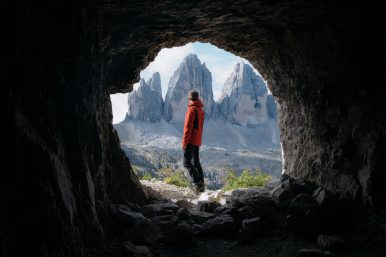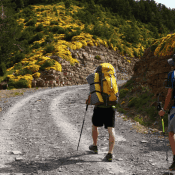How to Behave When Hiking: 9 Rules of Tourist Etiquette
Summer is the time of exciting travels and hikes. Thousands of people pack their backpacks and leave the stuffy cities in search of new experiences and an incomparable feeling of total freedom. However, even if you climbed high into the mountains or hidden in the woods, it does not mean that you can do absolutely everything you want.
In this article we will talk about the rules of good behavior, which must be strictly observed. This information is especially useful for beginners hikers or those who go abroad.
1. Give way going up
The tourist who goes uphill, is much more physically demanding than the one who goes down. In addition, he has a smaller field of view, focusing only on what he sees directly in front of him.
Always pass people coming up the narrow path. Just take a step to the side and let them pass freely.
2. Be aware of approaching cyclists and riders
In general, bicyclists should give you way on pedestrian paths. But you never know what these crazy people have in mind, especially when they are racing downhill on their mountain bikes. So when they approach you, it’s wise to stand back and let them pass quietly.
Be even more careful when you meet a rider or a horse-drawn group. Do not make any sudden movements, do not try to flirt or feed the horses, as it may scare them.
3. Don’t take up the whole trail
A hike is doubly enjoyable if you are in good company. The road is long and you have so many topics to talk about, so many new experiences to discuss. But as much as you’re passionate about talking, don’t forget the people around you.
4. The slowest in front
Group members may have different physical fitness, so a different pace of movement is optimal for each. Strong and inexperienced hikers often run far ahead, leaving weak and similarly inexperienced hikers somewhere behind. As a result, the first have to stop and wait, and the second crawl almost without rest, cursing the world, and especially their quick friends. Tension and mutual irritation build up in the group.
To avoid this, it is necessary to focus on the weakest participant. Suggest that he/she go ahead, so he/she sets the pace of the whole group. It is better to move a little slower, but to keep a good mood and positive mood of all participants of a campaign.
Although, of course, this rule may have variations and exceptions. For example, you can redistribute the load or suggest that the fast walkers go forward to prepare the camp and cook food while the slower ones pull up.
5. Watch the volume
People go camping to be at one with nature. Listen to birdsong, watch the surf, enjoy beautiful sunsets and sunrises. No one wants to rest to your squealing, shouting, swearing, singing or dancing. Observe the silence.
A special hello to the owners of wireless speakers that spread the sound around. It can be justified only in one case: you are crossing an area full of bears, and trying to scare them away. Otherwise, it is better to wear headphones.

6. Stay on the trail
Perhaps in your area you are used to walking wherever it is straightforward and clearly not forbidden. However, there are many countries where such habits are unacceptable. There, the movement in the protected area is allowed only on the paved hiking trail, any deviation is punishable by fines.
7. Do not leave trails
We think our readers do not need to be told once again that you should not litter. Other than that, you should not break trees, leave campfires, dig holes, or take anything with you. In short, your camp site should remain exactly as it was before you came.
8. Say hello
It may seem unusual for city dwellers, but all tourists say hello when they meet. And with locals too. Especially if you are in hard-to-reach places where people rarely walk. It is not necessary to have a long conversation, fill the travelers with questions or forcibly share their impressions. Just a smile and a greeting will suffice.
9. Observe the rules
Yes, we get out in nature to escape the city routine and the usual order. But that does not mean that you can do whatever you want in nature. In addition to the above-mentioned generally accepted rules of good manners, there are many restrictions that apply in individual countries or even on individual routes.
Somewhere you can’t walk with dogs. In another, you may find yourself on a trail reserved exclusively for horseback riding. In some countries sleeping in tents is strictly forbidden, in others it is allowed even on private territories.
In any case, try when planning a trip to familiarize yourself with the relevant rules for this area and follow them. This will help you avoid trouble and make your vacation a pleasant and memorable.




